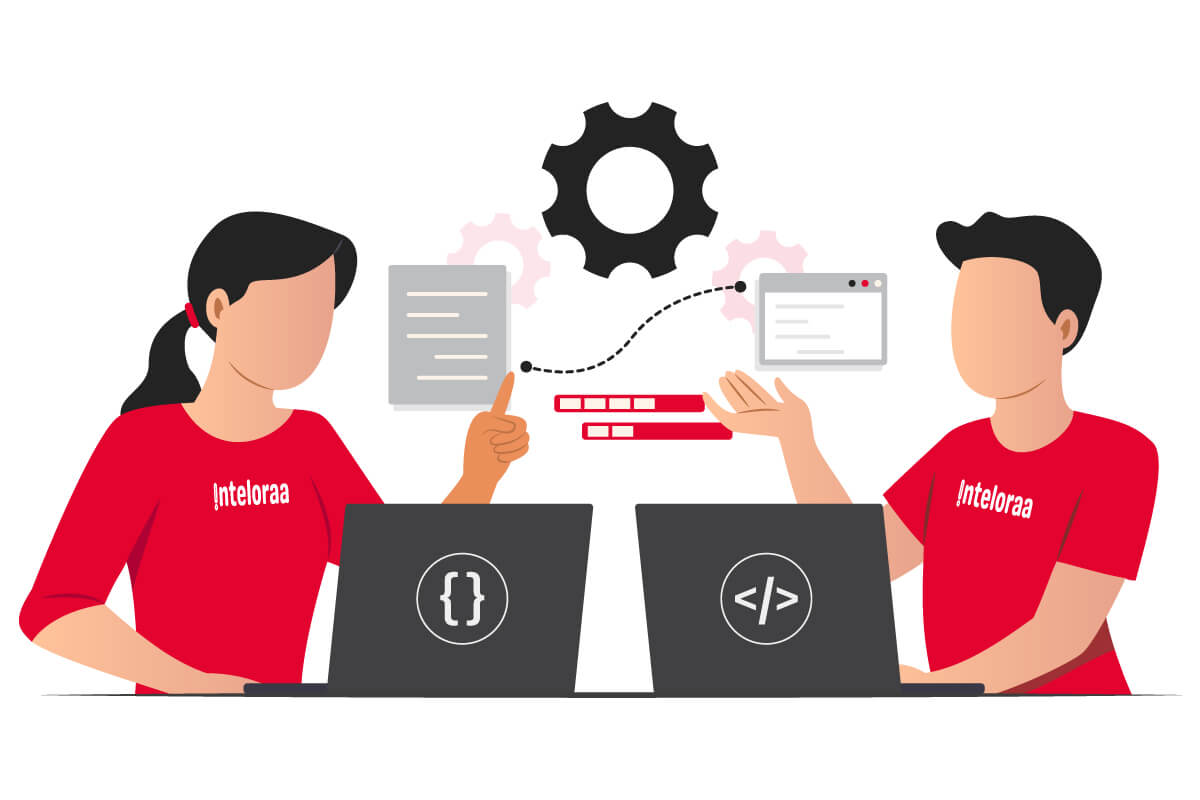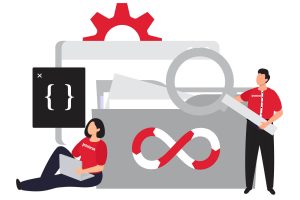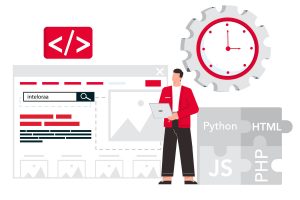The Role of Open Source Contributions in Advancing National Innovation

Introduction
Twenty years ago, if you wanted to build a website or develop software, you had to start from scratch or pay thousands for proprietary tools. Today, a college student in their dorm room can launch the next billion-dollar app using free, open-source tools that rival anything Fortune 500 companies use. That’s the magic of open source – and it’s quietly powering America’s innovation engine. While other countries scramble to build their tech capabilities, the U.S. has something special: a culture of sharing code, ideas, and breakthroughs that makes everyone move faster. At Inteloraa, we’ve seen firsthand how this collaborative approach is changing everything about how innovation happens in America.
What Open Source Really Means for Innovation
Let’s cut through the jargon. Open source basically means making your code public so anyone can see it, use it, and improve it. Think of it like sharing your grandma’s secret recipe – except instead of cookies, we’re talking about software that runs everything from your smartphone to Netflix.
The scale is staggering—over 150 million developers use GitHub to explore, collaborate on, and contribute to more than 420 million projects. This isn’t just a platform; it’s the backbone of modern software development. That’s not just a number – that’s millions of developers worldwide working together, building on each other’s work instead of reinventing the wheel every single time.
The impact is massive. Over five billion developer contributions were made to more than 500 million open source projects in 2024. And get this – in the US, 20.2 million developers created accounts on GitHub in 2023, which has increased by 21% from the previous year. That’s like adding the entire population of Florida to America’s developer community in just one year.
But here’s where it gets really interesting. When Tesla open-sourced their electric car patents, they weren’t just being nice – they were accelerating the entire industry. Same thing happens in software every day. When Netflix releases their streaming tools or when Google shares their AI frameworks, everyone benefits. Companies build better products faster, startups can compete with giants, and the whole country moves forward together.
This collaboration factor is what makes America special. While some countries try to build everything behind closed doors, we’ve created this incredible ecosystem where sharing actually makes you stronger. It’s like having millions of engineers working on your project for free – because in a way, that’s exactly what’s happening.
At Inteloraa, we’re part of this movement. Our team contributes to open source projects and helps our clients across the U.S. leverage these powerful tools for custom software development. And with our upcoming AI solutions, we’re excited to build on these collaborative foundations to help businesses innovate faster than ever before.
Open source isn’t just about free software. It’s about creating a national competitive advantage through collaboration. When everyone shares their best ideas, everyone gets better – and America wins.
GitHub: America’s Innovation Playground
Think of GitHub as Facebook for developers, but instead of sharing vacation photos, they’re sharing code that could change the world. And it’s become America’s secret weapon for staying ahead in the global tech race.
The numbers tell an incredible story. Most GitHub developers are based in the United States, followed by India, China, and Brazil, giving America a home-field advantage in the world’s largest code repository. Here’s a number that shows real momentum: In 2024, developers racked up 10.54 billion GitHub Actions minutes—a nearly 30% surge from the 7.3 billion minutes used in 2023. Automation isn’t just growing; it’s accelerating. That means automation and collaboration are accelerating at breakneck speed.
The American government is leading by example. The White House has 41 repositories available on GitHub, and NASA-DEVELOP has 54 repositories available. When NASA shares their mission control frameworks and the White House opens up their petition systems, they’re not just being transparent – they’re showing the world how democracy and innovation work hand in hand.
This isn’t just about big institutions either. GitHub has become the place where breakthrough ideas happen. Remember when a small team created React at Facebook and shared it openly? Now it powers millions of websites. Or when Google released TensorFlow? Suddenly, every startup could build AI applications that would have cost millions just years before.
The magic happens because GitHub eliminates the biggest barrier to innovation: starting from zero. Why spend six months building a basic user authentication system when someone has already perfected it and shared it for free? Why struggle with database connections when thousands of developers have already solved that problem?
For U.S. companies, this creates a massive competitive advantage. A startup in Austin can access the same foundational tools that Google uses. A research team at MIT can build on work from Stanford, Microsoft, and independent developers around the world. It’s like having a giant R&D department that never sleeps and includes the brightest minds globally.
At Inteloraa, we see this every day with our clients across the country. When we’re building custom software solutions, we’re not just coding from scratch – we’re standing on the shoulders of giants. Our GitHub contributions help other developers solve similar problems, and in return, we get access to incredibly sophisticated tools that make our work faster and better. It’s this collaborative approach that we’re bringing to our upcoming AI solutions, ensuring our clients get cutting-edge technology built on proven, community-tested foundations.
The real beauty is how this speeds up everything. Instead of every company solving the same basic problems over and over, developers can focus on the truly innovative stuff – the features and capabilities that make their products unique.
Real Impact on U.S. Research & Development
Open source isn’t just changing how we code – it’s completely transforming how America does research and development. And the numbers are mind-blowing.
Take universities, for instance. These are the places where tomorrow’s breakthroughs happen, and they’re absolutely crushing it with open source. Higher education R&D expenditures hit $108 billion in 2023 – that’s an 11.2% increase from the previous year. Much of this research now builds on open source foundations, meaning every dollar goes further than ever before.
Think about it this way. When a computer science professor at Stanford wants to teach machine learning, they don’t need to spend months building basic AI frameworks from scratch. They can grab TensorFlow or PyTorch, both open source, and jump straight into the cutting-edge stuff. Students graduate faster, research moves quicker, and breakthroughs happen more often.
The corporate world has caught on big time. Companies are discovering that open source isn’t just about saving money on software licenses – though that helps too. It’s about innovation speed. When you can build on proven, community-tested code, you can launch products in months instead of years. Your developers spend time solving unique problems instead of reinventing basic functionality.
Startups especially love this. Imagine you’re a small team in Portland trying to build the next big health app. Twenty years ago, you’d need millions just for basic infrastructure. Today? You can use React for your user interface, Node.js for your backend, PostgreSQL for your database, and deploy everything on open source container platforms. Suddenly, your biggest competition isn’t big tech companies with massive budgets – it’s whoever has the best ideas.
Government agencies are getting smart about this too. NASA doesn’t just use open source – they contribute back to it. When they share their mission planning software or satellite data processing tools, they’re not just being transparent. They’re helping every aerospace company, research institution, and startup move faster. It’s like having the world’s best space agency as your R&D partner.
The security benefits are huge too. When thousands of developers can examine code for vulnerabilities, problems get found and fixed fast. Compare that to proprietary software where only a small internal team reviews everything. It’s like having a thousand security experts versus having just five.
At Inteloraa, we see this transformation every day. Our custom software development projects leverage these incredible open source tools, which means our clients get enterprise-level capabilities at a fraction of what they’d cost to build from scratch. And as we roll out our AI solutions, we’re building on frameworks that have been tested by millions of developers worldwide. That’s not just smart business – that’s how innovation happens in 2025.
Universities do better research, which feeds into better open source tools, which helps companies innovate faster, which creates better products and services for everyone. It’s a virtuous cycle that’s making America’s entire innovation ecosystem stronger and more competitive globally.
The Challenges We Still Face
Let’s be real for a minute. Open source isn’t all sunshine and rainbows. Despite all the amazing benefits, there are still some speed bumps that keep companies and organizations from jumping in with both feet.
The biggest worry we hear is – Security. “If everyone can see the code, won’t hackers have a field day?” When code is out in the open, thousands of eyes are looking for problems. Bad guys can spot vulnerabilities, sure, but so can good guys. And there are way more good guys. Most security experts will tell you that “security through obscurity” – keeping code secret and hoping no one finds the bugs – is actually less secure than open source.
Then there’s the corporate hesitation. Some companies still think, “Why would we share our hard work for free?” They’re missing the bigger picture. When you contribute to open source, you’re not giving away your competitive advantage – you’re building a stronger foundation for everyone, including yourself. Plus, you get access to improvements and bug fixes from the entire community.
The skills gap is real too. Many organizations want to use open source tools but don’t have teams that know how to implement them properly. It’s like having access to a Ferrari but only knowing how to drive a tricycle. That’s where companies like Inteloraa come in. We help bridge that gap through our comprehensive software solutions and website maintenance services, making sure businesses can actually leverage these powerful tools effectively.
Another challenge is simply keeping up. The open source world moves fast – sometimes too fast. New frameworks, updated versions, security patches – it can feel overwhelming. Without proper digital marketing and technical guidance, companies can feel lost in the shuffle.
Better education and training programs are popping up everywhere. The government is launching initiatives to support open source adoption. And companies like ours are making it easier for businesses nationwide to navigate this landscape without getting lost in the technical weeds.
Looking Forward: The Future is Collaborative
So what’s coming next? If you think open source has been a game-changer so far, you haven’t seen anything yet.
AI is about to supercharge everything. We’re already seeing incredible open source AI models that rival anything the big tech companies are building behind closed doors. When a small team can access the same AI capabilities as Google or Microsoft, the playing field becomes incredibly level. Innovation isn’t limited to whoever has the biggest budget anymore – it’s about who has the best ideas.
America has a massive opportunity here. We’ve already built the culture and infrastructure for collaborative innovation. While other countries are trying to catch up, we can lead the next wave by doubling down on what we do best: bringing people together to solve big problems.
The role of companies like Inteloraa is evolving too. We’re not just service providers anymore – we’re innovation enablers. Our upcoming AI solutions will be built on open source foundations, which means our clients across the U.S. get cutting-edge technology that’s been tested and improved by developers worldwide. It’s like having a global R&D team without the global R&D budget.
We’re also seeing more collaboration between the private sector, universities, and government. When NASA shares code with startups, when universities work directly with companies on open source projects, when government agencies use the same tools as Silicon Valley – that’s when magic happens.
The future isn’t about one company or one country hoarding all the best technology. It’s about creating ecosystems where the best ideas can flourish, regardless of where they come from. And honestly? That’s very American. We’ve always been at our best when we’re working together toward something bigger than ourselves.
Conclusion
Here’s what it all comes down to: open source isn’t just changing how we write code – it’s changing how America innovates. When millions of developers share their best ideas, when universities can access cutting-edge tools for free, when startups can compete with tech giants, everyone wins.
This collaborative approach is making our entire country more competitive. While others are building walls around their technology, we’re building bridges. And those bridges are carrying us toward breakthroughs we couldn’t achieve alone.
At Inteloraa, we’re proud to be part of this movement. Whether it’s custom software development, AI solutions, or digital marketing strategies, we believe the future belongs to those who work together.
That’s the open source way, and it’s the American way. Let’s build the future together.
Belayet Riad
Founder & CEO, Inteloraa
Top Rated Freelancer with over 12+ years of experience as a Full Stack Developer, specializing in front-end development and building exceptional digital experiences for modern businesses.
Contact / Request Quote



